Many people ask the question, “Is social media necessary to get good search engine rankings?”
In my opinion, they are starting with the wrong question. I think the die has already been cast on the importance of social media and whether or not it should be an integral part of SEO. (It should.)
The real question is, “Can SEO thrive without social media?”
To that, I firmly believe the answer is “No”. Not today, and not for as long as social media continues to play a role in shaping society. Until the great EMP hits, I don’t see social media losing its grip on how we live our lives. Which means, search engines will look for ways to incorporate certain social signals into their ranking algorithms. And rightly so. Social media, essentially, is the real-time pulse of what we like, dislike, love, and loath. It only makes sense that search engines want to measure this in order to make rankings more relevant for both the masses and each person individually.
Social Media Changed SEO Forever
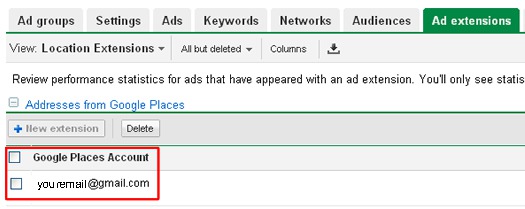
The truth is, social media has truly changed the SEO landscape. There is no going back.
Historically, links were the primary off-page factor that search engines could consider when analyzing a site’s importance, authority and popularity. Social media is the new backlink.
In fact, the Russian search engine Yandex has recently taken links completely out of their algorithm in favor of other external signals. Matt Cutt from Google has made it known that they have also tested dropping backlinks from their algorithm. While he admitted that they were unable to maintain the high level of quality in those tests, it wouldn’t surprise me if Google continues to devalue links over time until they are almost completely out of the picture.
Personally, I don’t think Google will ever need to remove links completely, but relying on them less and finding alternate link value mechanisms is likely coming soon to a Google algorithm near you.
So as links get valued less, that means something has to be valued more. That something is, undoubtedly social media. Of course, “social media” ranking factors are about as broad as “on page” ranking factors. Just as there can be several dozens of on-page factors that search engines look at, there can also be several dozens of social factors that are included. And that’s what makes social such a powerful addition to the mix of algorithm signals. There are a lot of different signals to tweak and adjust until a great balance is struck with the rest of the factors.
But it wasn’t always this way.
How to Get Rankings in 1999
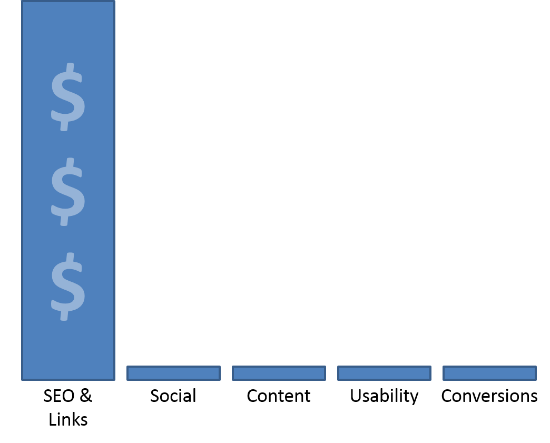
Without going into a full history of search engines algorithms, it’s important to understand that it wasn’t all that long ago that search engines looked almost entirely at on-page factors for rankings. Google introduced using links as a factor, which helped make their results more relevant than the rest of the engines of the day. Back then, people only linked to site’s that added value to what they were doing.
Of course, that opened up a whole can of worms and led to massive link manipulation by the SEO industry. Google had to start cracking down on “bad” links even to the point of devaluing links made with improper intent. That’s to say, if the value of the link to the website’s audience isn’t as important as the reasons why the link was placed. Value be damned, it’s intent that matters!
But the point is, back then, on-page optimization and links were all there was and that’s where businesses poured their web marketing dollars into. But in 2014, we see an entirely different picture.
How to Get Rankings in 2014
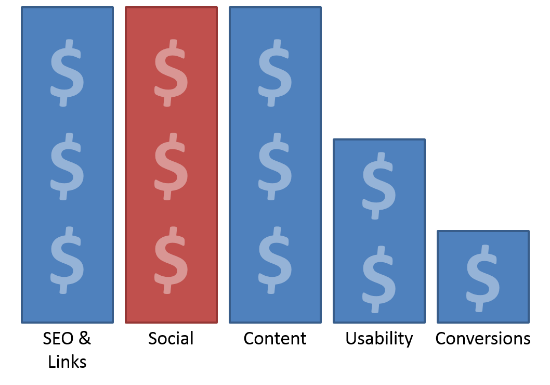
Today, there are more factors than ever, with social media being just one of them. Other factors such as content, usability issues and even conversion optimization play growing role in how the search engines analyze a site for ranking purposes. Remember, search engines want to deliver site’s that searchers find valuable. If the content is crap, the site is hard to use, or has low conversion rates, these are all signals to the search engine that the site itself is of low searcher value.
But for this post I’ll focus on the social aspects and how those impact search engine rankings overall.
Last year Moz posted a study that showed the Amazing Correlation Between Google +1s and Higher Search Engine Rankings. It didn’t take long for Matt Cutts to debunk that study going into the differences between correlation and causation. In his post, Matt posted a link to this comic:
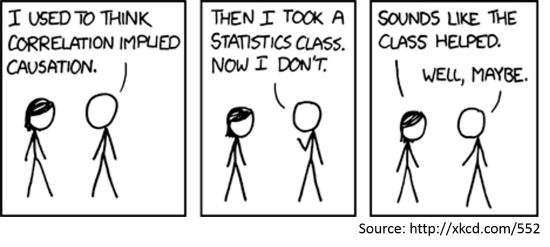
I don’t care to get into the correlation vs. causation debate, and we don’t have to in order to understand that one thing doesn’t have to be the cause of something specifically in order for it to have an impact. In this case, social share may not directly play a role in Google’s algorithm, but the things that make any piece of content get socialized a lot tend to be the things that do help it rank better.
So if your content gets shared, your rankings are likely to go up because the content has all the ingredients Google’s ranking algorithm is looking for. It’s not the shares that are pushing your rankings up, it’s the other stuff. The shares (and rankings) are just a byproduct of the good stuff.
However, the whole question of social shares impacting search engine rankings isn’t even a great question. Social shares are just one social media signal. The better question to ask here is, “Does social media help with SEO?”
Social Correlation Can Assist SEO Causation
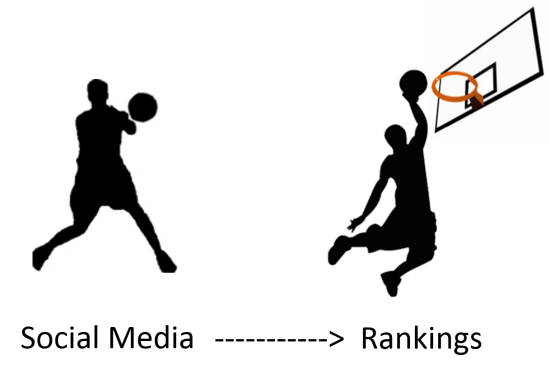
If social media marketing doesn’t directly cause rankings, it most definitely provides an assist. That’s because social content earns the very same signals that the search engines are looking for. This may not be a direct result of social media but, at this point, it’s hard to separate the two. Content that deserves rankings also deserves to do well in the social sphere. And content that does well in the social sphere also deserves to rank well.
Of course, that last statement isn’t 100% true. But the more competitive an industry is the truer it becomes. I’ve always said that SEO is a game of baby steps. That’s to say rankings are achieved by doing a whole lot of small things. The more competitive an industry, the more businesses there are doing more of those small things. Including social things that lend to the SEO things.
If social media doesn’t directly increase rankings, it certainly increases ranking opportunities. Social media offers an amazing ability to promote one’s content. That’s not to say that social media is a promotion platform. It’s not. Social media is an engagement platform. Promotion is a part of that engagement, but a very small one. Or at least it should be a small part. But whether you’re directly promoting yourself, sharing someone else’s content, talking about something you’re passionate about, or having a conversation, all of that feeds into a self-promotional aspect.
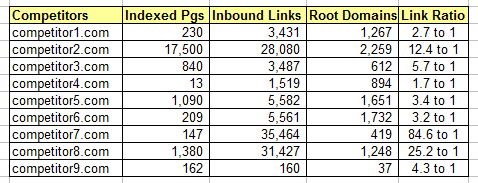
No matter how significant a role engagement plays with your social media efforts, social media is still a very narcissistic activity. We blog, engage, and promote because we think we have something important to contribute. Perhaps we are all narcissists! But it’s that sense of importance that keeps us engaging over and over again. Ask yourself honestly, would you continue to do what you do on social media if no one engaged, followed, or commented back? Yes? Maybe, but what if no one was to ever read what you have to say? I’m going to go with no on that.
So social media, even as an engagement platform, offers something of value to us. What is that value?
Hopefully something a bit more meaningful than just feeding our egos. In fact, social media does offer us an avenue to increase our ranking opportunities. Writing and socializing awesome content builds up the very signals that search engines look for when ranking sites and pages for keywords. While site’s don’t rank for keywords, they do have an incredible effect on the ability of any single page to rank. The value of a site is assessed just as the value of a page is assessed and the value of the site assessment is passed on to the page.
Engaging in social media has both a site-wide and a page specific effect that can translate into ranking opportunities that you may not have had otherwise. And with more and more site’s jumping on the social bandwagon, if you’re not on board, you are allowing competitors to get ahead of you in a very critical area. It may only be baby steps, but a lot of baby steps can add up very quickly in a competitive field.
Despite all the dire predictions over the past 15 years, SEO hasn’t died. And it won’t. But that doesn’t mean it can survive in a vacuum. It can’t. Just as good SEO required links in order to help a site achieve top search engine rankings, today, SEO needs social media for the very same reason.
Just as it’s difficult to have great health without both exercise and eating right, it’s difficult to achieve top search engine rankings without both SEO and social media. You can do great SEO, but rarely is it enough to succeed without other online marketing components–especially the social component.
So the answer to the question, “Can SEO thrive without Social Media?” is no. SEO is simply not as effective without social media marketing working right along side it.
Image Credits
Featured Image: Created by author for Search Engine Journal
Image #2, #3 and #5: Created by author for Search Engine Journal
Image #4: via xkcd

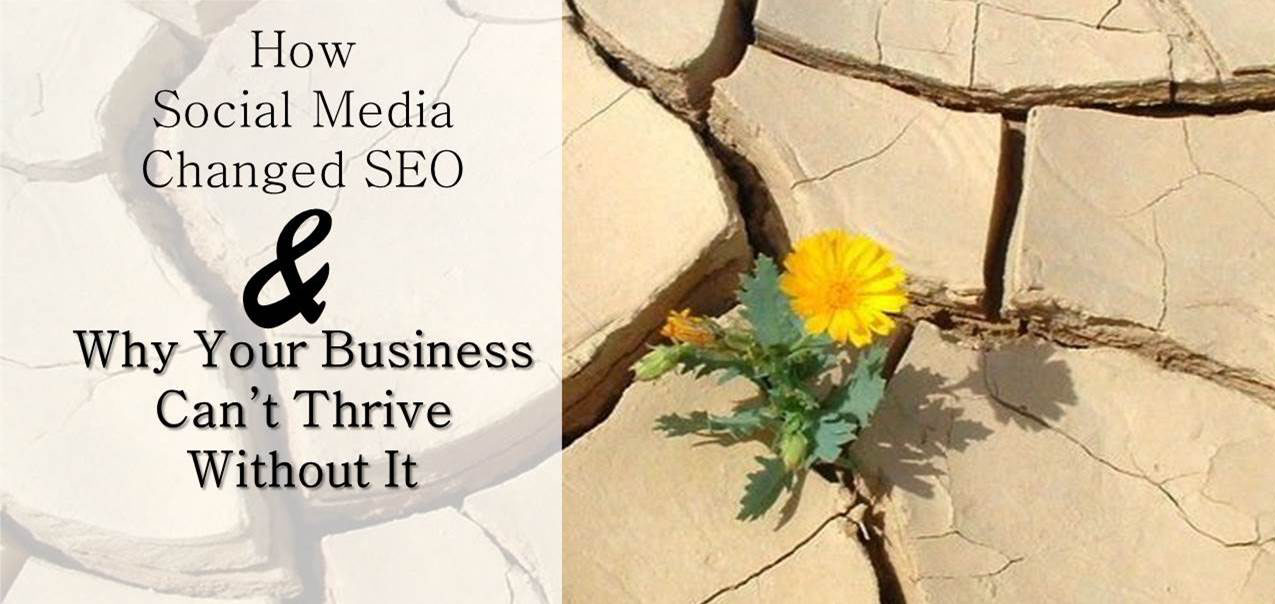



![AI Overviews: We Reverse-Engineered Them So You Don't Have To [+ What You Need To Do Next]](https://www.searchenginejournal.com/wp-content/uploads/2025/04/sidebar1x-455.png)